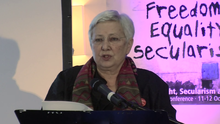Marieme Helie Lucas

Marieme Helie Lucas is an Algerian sociologist as well as an activist for women's rights and secularism. She occupied leadership positions in human rights groups starting in the 1980s.
Quotes
[edit]In 1988, Algeria experienced a youth revolt that shares many similarities with the Tunisian uprising that occurred two decades later. The movement was spontaneous, disorganized, and lacked a political agenda. While it was not, to our knowledge, sparked by Religious Right organizations, they quickly seized control once it began. There were no Left-wing groups to step in. Similar takeovers of popular uprisings by the religious Far Right have been seen in Tunisia and Egypt in recent years. The silence of the Left in the West regarding the marginalization of progressive forces in the region remains an issue that requires further exposure and research
- The Left appears to be hindered by Eurocentrism, focusing more on their own struggles with government policies towards migrant minorities in Europe. They applied their analysis of this situation to events in our countries, neglecting the vital resistance forces against the Muslim Far Right. In prioritizing victims of the state, they created a hierarchy of victims, overlooking those targeted by non-state actors. By failing to address the crimes committed by Muslim fundamentalist non-state groups against women, they also established a hierarchy of rights, where women's rights are placed last, after religious, cultural, and minority rights.
- Secularism is the legal and administrative principle that separates the state from organized religions. It was established during the French Revolution and later formalized in the 1905-1906 laws on separation. Article 1 of these laws guarantees individuals the freedom to believe and practice their faith. Article 2 states that the Secular Republic neither recognizes, engages with, nor funds religions, their representatives, or institutions. In a secular Republic, all citizens are equal and have the same rights under the law.
- Reactionary forces have always sought to govern in the name of God. Secularism, defined as the separation of religion and state, is the most effective way to prevent them from directly wielding political power. Historically, progressive religious interpreters and liberation theologians have been marginalized and defeated within their own religious traditions.
- I realized failing is still better than doing nothing to regain one’s rights and human dignity.
- “You are probably right, but if we try and fail, we can at least tell our daughters we tried but could not change the conditions, now it is your turn to try. But if we do nothing and just watch the rights that our mothers and grandmothers fought to secure for us wash away at the whims of fundamentalist and corrupt politicians, what do we have to tell them?”
- [2]]
- Describes sexual liberation as ‘served on a plate’

